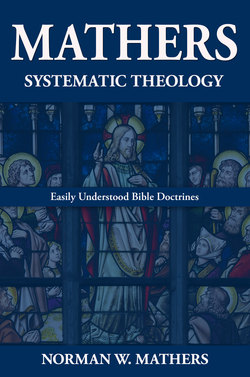Читать книгу Mathers Systematic Theology - Norman W. Mathers - Страница 19
2.5 The Inerrancy of the Word of God 2.5.1 The Word of God is completely without error.
ОглавлениеShedd (1948:1:76-77) argues that it is highly improbable that God would not guarantee the accuracy of the recording of the revelation that He gave. Further, he argues that even if there were difficulties it would not change any scripture or doctrine. A verbal plenary inspired bible is an error free bible. It is a direct contradiction to have an inspired but not an inerrant bible. The idea that the bible can only be trusted in matters of salvation but not in other subjects came out of Germany as early as 1650 by Calixtus (ibid:1:74). This idea of limited inerrancy was restated by Baumgarten in 1725. The Scriptures on the subject of salvation are so interrelated to what Shedd calls secondary matters that discrediting one discredits the others (ibid:1:74-75). The epistle of Jude verse 3 tells us that we are “to contend for the faith” (the body of truth) “once for all delivered to the saints” [author’s translation] (Aland & Black 1968:832). Chafer commenting on the many variant readings in the critical text reminds us that we need not be alarmed. We have a great wealth of manuscripts (1971:1:87). This author adds that the science of textual criticism helps us to determine the textual reading that is in question. The external and internal evidence clears up these difficulties. The original autographs can be arrived at in the sparse number of variant readings because of science of textual criticism. Those who claim an errant bible argue from trivial matters relating to numbers or dates (Hodge 1975:1:169). It becomes apparent that these are superficial. These alleged errors when submitted to careful examination are cleared up. Many of these so called errors in scripture are the result of transcribers (ibid:1:169). Those who argue that the Bible is inerrant in the original autographs are begging the question. An inspired Bible is an inerrant Bible. The miracle is that the Bible written by many different authors from different cultures, over a period of 1600 years agrees under the Holy Spirit’s guidance (Chafer 1971:1:29). The unity of the Bible argues for the oversight and control of the Holy Spirit in the writing of the scriptures (Chafer 1971:1:29, 94). The gospels, for example, do not have to agree in every instance because each writer had a particular purpose and theme in writing his gospel. Hodge (1975:1:170) argued that it is not necessary to agree perfectly in everything but only on one hypothesis that the writers of scripture wrote under the divine inspiration of the Holy Spirit. Historical and scientific objectors must realize the truth of John 10:35. Distinction must be made between the theories of men and the facts of God. The Bible contradicts the theories of men but not the facts of God (ibid:1:171). The Bible has answered all the great questions of the ages concerning God, man, life after physical death, and the future (ibid:1:171). It might be added that the Bible answers the question of salvation and assurance of the believer. The Bible has a unique view of God when compared to other religions and philosophers. Hodge (ibid:1:171) points out that God to the eastern world is unconscious ground of being. God is all nature to the Greeks. To the philosopher Fichte, man’s subjective ego is God. To Schelling, God is the “One.” It is the union of the subject with the object the One that is the divine God experience (ibid:1:171). To the Christian, it is receiving Jesus Christ as their personal Savior (John 1:12, 14:6).
